The content of the article
It would seem that special if a person has a runny nose? Indeed, a runny nose does not pose any danger if it lasts no more than a week and the snot has a transparent color. However, if the disease is delayed, and there is no improvement, many people ask themselves the question - is it not an allergic nature? This is especially true for children, because their immune system is not fully formed and the parents cannot be sure if the baby is allergic to something.
To confuse allergic rhinitis with a cold is very simple. Many symptoms of acute respiratory viral infections can also be caused by allergies - sneezing, coughing, and lacrimation. What to do in this situation? How to distinguish one from the other? After all, if the runny nose allergic nature, the principles of treatment change radically.
What distinguishes the cold from allergic rhinitis
Everyone knows how a viral disease develops, but not everyone is familiar with an allergic reaction. If you have a runny nose, pay attention to the associated symptoms.
- Origin. Often a person knows the cause of a viral infection. That is, a runny nose is probably a cold if appeared after hypothermia or after contact with a sick person. Allergic rhinitis appears most often suddenly, it develops quickly.
- The causative agent. If you have an allergic rhinitis, you can try to track the allergen that your body reacts to. Analyze when a runny nose is activated. If mucus secretion increases in the room, pay attention to dust or possible allergens in this house. Sometimes a runny nose occurs on animal hair, after inhaling the pollen of certain plants. If the runny nose is activated only at night, a reaction to the pillow filler is possible.
- Temperature. If cold is a cold, pay attention to body temperature. If it is at least slightly increased (usually in the first days of the disease), then the nature of the common cold is catarrhal. If there is no temperature, it does not mean at all that a runny nose is definitely allergic - sometimes a cold can also pass without a fever.
- Eyes. When you can not understand the cause of a cold, pay attention to the eyes. If they are very watery, they swell and itch, most likely you are allergic. In the event that only slight soreness is felt, tingling and burning in the eyes - this is more like cold symptoms. It happens that allergic rhinitis is often accompanied by allergic conjunctivitis.
- Cough. Often a runny nose (both cold and allergic) is accompanied by a cough. Pay attention to this cough. A dry cough can be both for allergies and colds, but a wet cough is an accurate indicator of a viral infection. A dry, long-lasting cough for several months can turn into asthma, if its nature is allergic. Usually, with such a cough, the doctor does not hear wheezing, the lungs are clean.
- Snot. If the headache is allergic in nature, the nasal mucus is usually clear. When bacterial rhinitis mucus becomes thick, yellow or green.
- Itching. When allergic rhinitis in the nose there is a strong itch, during a cold, there is no such an itch. The nose itches at the very base, which is why allergic people often rub their nose with their hands, frowning.
- Smell. During allergic rhinitis, smells are completely absent, while cold catarrh only slightly reduces the intensity of the aroma.
- Sneezing A person can sneeze as during a cold, and during allergies. However, the nature of sneezing can tell us about the pathogen. If you sneeze several times throughout the day, you probably have a cold. But lingering bouts of sneezing (15-20 times) speak about allergies.
- Change skin color. Often, in allergies with experience, in addition to the common cold, dark and blue circles under the eyes can be found.
- Flow time Another way to identify the type of rhinitis is to pay attention to its duration. If the runny nose passes for 7-10 days completely, then it is most likely ARVI. If a rhinitis in various degrees accompanies you for a long time (especially in spring and summer) - this is an allergy.
- Rash. In allergic rhinitis, the reaction of the body is often not limited to snot and cough. Allergy sufferers may experience various skin rashes, hives, and even eczema.
- Genes. If parents are allergic, there is a high probability that their child will also suffer from various kinds of allergic reactions. Allergy susceptibility is a hereditary pathology.
- Antihistamines. It is not difficult to distinguish a cold from allergies, if there are antihistamines on hand. Having drunk one pill, a person with a cold will notice only barely lightened nasal breathing, because the medicine relieves swelling. If you are allergic, antihistamine medicine will give complete relief, albeit temporary.
- Lymph nodes. With colds, they tend to increase slightly.
- Wheezing. In allergic rhinitis, wheezing and even choking can occur. This is especially characteristic of children, since their laryngeal lumen is very small, and even a slight swelling completely covers it.
- Throat. As a rule, with SARS, the throat becomes very red, sometimes even purulent (if a bacterial infection joins). But in case of allergic rhinitis, the throat can have only minor reddening, which appeared from barking allergic cough.
- Smoking. If you smoke - this is a big risk factor for the development of allergies.
- Condition. A person who has a cold has a general feeling of well-being - there is an ache in the joints, an appetite is lost, one wants to sleep, and one has a headache. This is especially noticeable in children - they become capricious, lethargic, whiny.
These are detailed symptoms by which you can distinguish a cold from allergic rhinitis. However, sometimes the allergic nature of rhinitis often becomes bacterial, and vice versa. That is why an allergist will help to cope with this task. He will ask you in detail about your lifestyle, about the presence of pets in the house, as well as about allergies among relatives. Often, patients are assigned allergy tests that can detect not only the fact of allergy, but also help identify the allergen.
How to treat colds and allergic rhinitis
It is not difficult to treat a cold cold, the main thing is not to start the process. You need plenty of drink - not a cup of raspberry tea, but 2-3 liters of warm liquid. This will allow you to wash the virus out of your body as soon as possible. In addition, you need to drink antiviral drugs, increase immune activity. Moisten the air in the room, ventilate the room so that the nasal mucosa does not dry out. As a treatment for the common cold, inhalations, nasal washing, warming up are very effective. You can dig in the nose juice of garlic, onion, aloe and black radish.If the nose is stuffed up, use vasoconstrictor drugs, but remember, they cannot be used for more than five days - they are addictive. A few days of such treatment - and the patient will certainly get better.
To deal with allergic rhinitis is more difficult. Especially if you can’t identify the allergen. It is necessary to pay attention to the bedding and textiles in the house - curtains, sofa upholstery, bedspreads, carpets. If possible, they should be discarded, and those that remain should be vacuumed as often as possible. Wet cleaning should be done daily. Allergies can be on some products, on animal hair, on drugs, on pollen. The main treatment for allergic rhinitis is the identification of the allergen and the possible prevention of contact with it.
Allergy sufferers can install fine filters in their homes, stop smoking, and monitor their hygiene more closely. To alleviate the symptoms of allergic rhinitis, you should always carry antihistamines with you.
If a person suffers from allergies, he himself can usually distinguish allergic rhinitis from a cold, and is well aware of his sensations.But parents of young children have a hard time - they are still looking for the right diagnosis. However, an experienced doctor will help to distinguish one from the other, and prescribe adequate treatment.
Video: how to distinguish allergic cough from infectious


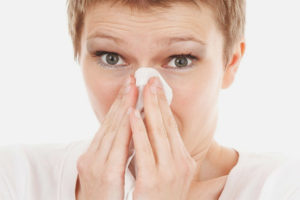
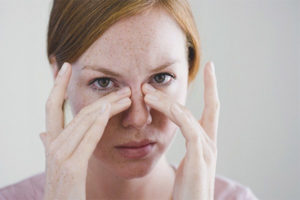
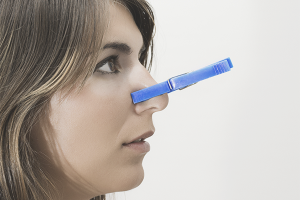

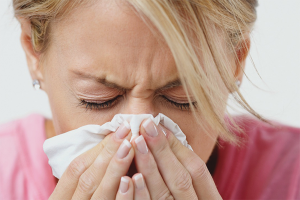
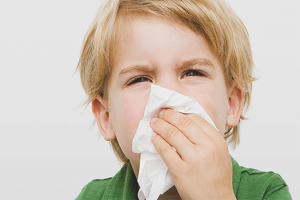
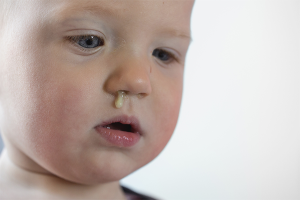
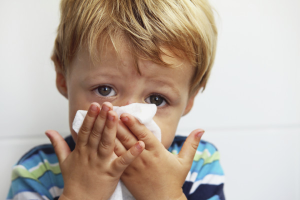
To send